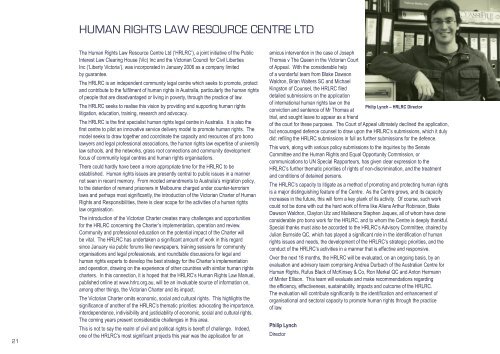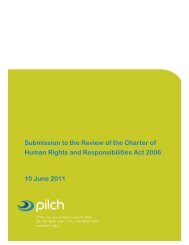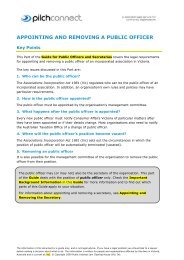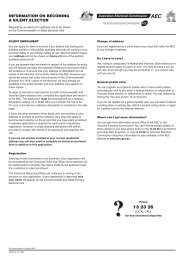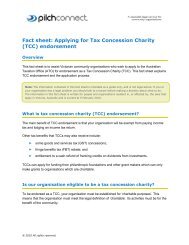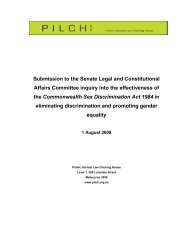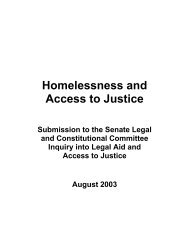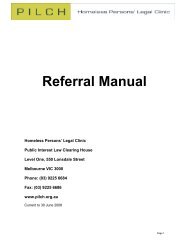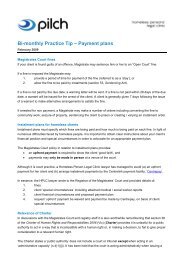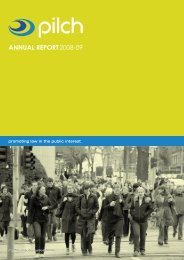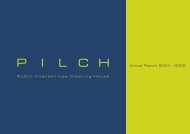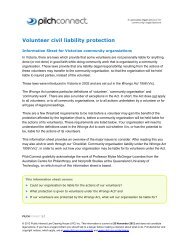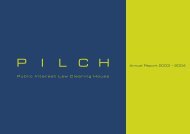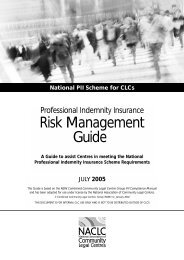Annual Report 2005-2006 - pilch
Annual Report 2005-2006 - pilch
Annual Report 2005-2006 - pilch
Create successful ePaper yourself
Turn your PDF publications into a flip-book with our unique Google optimized e-Paper software.
HUMAN RIGHTS LAW RESOURCE CENTRE LTD<br />
21<br />
The Human Rights Law Resource Centre Ltd (‘HRLRC’), a joint initiative of the Public<br />
Interest Law Clearing House (Vic) Inc and the Victorian Council for Civil Liberties<br />
Inc (‘Liberty Victoria’), was incorporated in January <strong>2006</strong> as a company limited<br />
by guarantee.<br />
The HRLRC is an independent community legal centre which seeks to promote, protect<br />
and contribute to the fulfilment of human rights in Australia, particularly the human rights<br />
of people that are disadvantaged or living in poverty, through the practice of law.<br />
The HRLRC seeks to realise this vision by providing and supporting human rights<br />
litigation, education, training, research and advocacy.<br />
The HRLRC is the first specialist human rights legal centre in Australia. It is also the<br />
first centre to pilot an innovative service delivery model to promote human rights. The<br />
model seeks to draw together and coordinate the capacity and resources of pro bono<br />
lawyers and legal professional associations, the human rights law expertise of university<br />
law schools, and the networks, grass root connections and community development<br />
focus of community legal centres and human rights organisations.<br />
There could hardly have been a more appropriate time for the HRLRC to be<br />
established. Human rights issues are presently central to public issues in a manner<br />
not seen in recent memory. From mooted amendments to Australia’s migration policy,<br />
to the detention of remand prisoners in Melbourne charged under counter-terrorism<br />
laws and perhaps most significantly, the introduction of the Victorian Charter of Human<br />
Rights and Responsibilities, there is clear scope for the activities of a human rights<br />
law organisation.<br />
The introduction of the Victorian Charter creates many challenges and opportunities<br />
for the HRLRC concerning the Charter’s implementation, operation and review.<br />
Community and professional education on the potential impact of the Charter will<br />
be vital. The HRLRC has undertaken a significant amount of work in this regard<br />
since January via public forums like newspapers, training sessions for community<br />
organisations and legal professionals, and roundtable discussions for legal and<br />
human rights experts to develop the best strategy for the Charter’s implementation<br />
and operation, drawing on the experience of other countries with similar human rights<br />
charters. In this connection, it is hoped that the HRLRC’s Human Rights Law Manual,<br />
published online at www.hrlrc.org.au, will be an invaluable source of information on,<br />
among other things, the Victorian Charter and its impact.<br />
The Victorian Charter omits economic, social and cultural rights. This highlights the<br />
significance of another of the HRLRC’s thematic priorities: advocating the importance,<br />
interdependence, indivisibility and justiciability of economic, social and cultural rights.<br />
The coming years present considerable challenges in this area.<br />
This is not to say the realm of civil and political rights is bereft of challenge. Indeed,<br />
one of the HRLRC’s most significant projects this year was the application for an<br />
amicus intervention in the case of Joseph<br />
Thomas v The Queen in the Victorian Court<br />
of Appeal. With the considerable help<br />
of a wonderful team from Blake Dawson<br />
Waldron, Brian Walters SC and Michael<br />
Kingston of Counsel, the HRLRC filed<br />
detailed submissions on the application<br />
of international human rights law on the<br />
Philip Lynch – HRLRC Director<br />
conviction and sentence of Mr Thomas at<br />
trial, and sought leave to appear as a friend<br />
of the court for these purposes. The Court of Appeal ultimately declined the application,<br />
but encouraged defence counsel to draw upon the HRLRC’s submissions, which it duly<br />
did: refiling the HRLRC submissions in full as further submissions for the defence.<br />
This work, along with various policy submissions to the inquiries by the Senate<br />
Committee and the Human Rights and Equal Opportunity Commission, or<br />
communications to UN Special Rapporteurs, has given clear expression to the<br />
HRLRC’s further thematic priorities of rights of non-discrimination, and the treatment<br />
and conditions of detained persons.<br />
The HRLRC’s capacity to litigate as a method of promoting and protecting human rights<br />
is a major distinguishing feature of the Centre. As the Centre grows, and its capacity<br />
increases in the future, this will form a key plank of its activity. Of course, such work<br />
could not be done with out the hard work of firms like Allens Arthur Robinson, Blake<br />
Dawson Waldron, Clayton Utz and Mallesons Stephen Jaques, all of whom have done<br />
considerable pro bono work for the HRLRC, and to whom the Centre is deeply thankful.<br />
Special thanks must also be accorded to the HRLRC’s Advisory Committee, chaired by<br />
Julian Burnside QC, which has played a significant role in the identification of human<br />
rights issues and needs, the development of the HRLRC’s strategic priorities, and the<br />
conduct of the HRLRC’s activities in a manner that is effective and responsive.<br />
Over the next 18 months, the HRLRC will be evaluated, on an ongoing basis, by an<br />
evaluation and advisory team comprising Andrea Durbach of the Australian Centre for<br />
Human Rights, Rufus Black of McKinsey & Co, Ron Merkel QC and Anton Hermann<br />
of Minter Ellison. This team will evaluate and make recommendations regarding<br />
the efficiency, effectiveness, sustainability, impacts and outcome of the HRLRC.<br />
The evaluation will contribute significantly to the identification and enhancement of<br />
organisational and sectoral capacity to promote human rights through the practice<br />
of law.<br />
Philip Lynch<br />
Director


